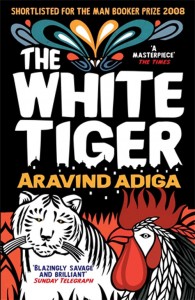Engaging Scoundrels
Come with me, dear reader, on an exciting journey through smells, sights, opportunities, lies and crimes. I will entertain, engage, challenge and confide in you. I will be a most trusted guide and nothing that I say can be believed.
A good first-person narrator can take a reader by the wrist, or wallet, or throat and lead us through all manner of adventure. A tried and true technique, it is extraordinarily effective in the right hands. Aravind Agida employs it fully in his debut novel The White Tiger. Dark and comical, the book references, borrows and steals from all the right sources: Richard Wright, James Baldwin, and Ralph Ellison, but also Defoe, Rushdie and Barth. It is the story of a charming and untrustworthy man living in multiple worlds – modern India.
The overall structure is the personal history of Balram (or Munna), an Indian entrepreneur, as written in a series of letters to Chinese Prime Minister Wen Jiabo, who is scheduled to visit Bangalore. Balram tells his own story as way of explaining India; it is a story within a story. Born in “Darkness” or abject poverty in a rural village, Balram experiences privation and disappointment despite being identified as intelligent, a “White Tiger.” He is only partially aware of his misery in his lot until he becomes a driver for a rich man with family connections to his village. He journeys to the city, “Light,” comes to understand more clearly his situation and the way that India “works.” It is a voyage of knowledge, cynicism, and advancement. Balram eventually murders his employer in order to break free and to establish a new identity, business, and future. The novel’s coda is a recount of how Balram the businessman handles the death of a child run over by one of his employees: with bribery, influence peddling and power.
Agida gives Balram great intelligence but little knowledge, and as his perspective becomes more informed, an ever greater sense of agency. Balram’s morality is thin at best. He murders in cold blood and is ruthless. One the other hand, the very sense of right and wrong is problematized throughout, as “justice” seems to be irrelevant to the world in which the characters live. inhabit. Agida’s satire is of India and Balram is the vehicle. Balram the quintessential traveler, an alien in his own land, a visible invisible man. He parodies the myth of the self-made man. Balram has access to many voices: the subaltern, the Quisling, the entrepreneur, the internal immigrant, and the business man.
And though a cold character, above all, Balram is very funny.
Winner of the Man Booker Prize in 2008, The White Tiger is the kind of literature that entertains and provokes – a good and thoughtful read.